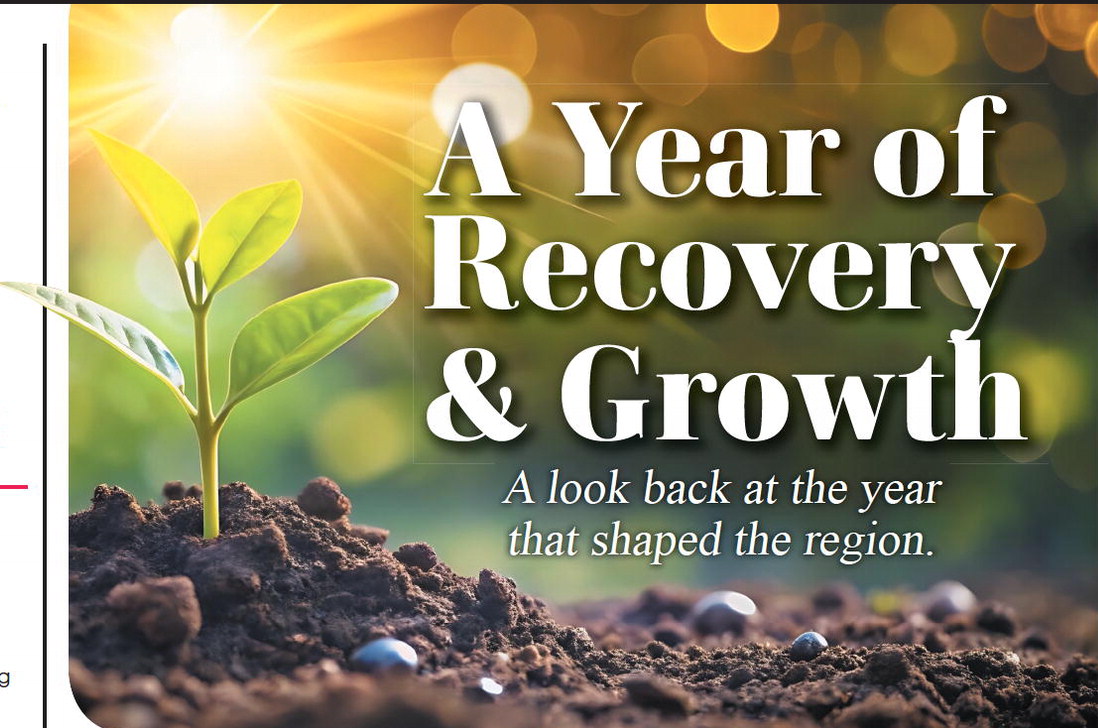Curran, Furman Headline Chamber Business Summit


mrandolphadvance@gmail.com
The 2nd Annual Greater Vidalia Business Summit, held on Thursday, September 22, featured two keynote speakers, who not only kept the crowd engaged but also involved in the discussions.
Rennie Curran
Former University of Georgia and Tennessee Titan linebacker Rennie Curran spoke at the Business Summit and to students at an assembly on Wednesday, September 21. The large auditorium of Southeastern Technical College was filled with energy as Curran spoke to students from Toombs County High School, Vidalia High School, and STC’s Cosmetology program about the importance of positive leadership.
Curran kept students engaged in the event through the utilization of several activities, including a greeting game. He challenged students to notice the differences in their attitudes and perspectives in different scenarios, and to adjust these mindsets in order to be successful.
“E + P = O,” he told the group. “Events that happen to you plus your perspective equal your outcome. This means that you have the power to decide what becomes of situations you may not be able to control.” Curran referenced his own life and the feelings he had while transitioning from a professional football player to a student at the University of Georgia. “I didn’t know what to do,” he explained. “I had been a football star, and now I was the old man on campus. People would walk up to me and tell me that they remembered watching me play for UGA when they were kids.”
Yet, Curran said he continued to his focus on obtaining his degree, which led him to work on his writings and other engagements. In turn, this whelped him to become an author, keynote speaker, and personal development coach. He asked students to share their examples of choosing to change their perspective to bring a positive outcome to events.
Several students spoke up, including Toombs County senior Tank Morris, who reminisced on his journey to a state wrestling title. “My freshman and sophomore year, I made it to state in wrestling each year, but I didn’t place at all,” he said. “My junior year, last year, I got tired of losing, so I put in more work, made it to the finals, and won state.”
Curran emphasized, “These challenges are not here to break you; they are here to build you. We all have things that happen to us. Life is not fair. But with the right mindset and attitude, you can take the worst things that happen to you and turn them into great things. You just have to have a powerful vision and purpose. You have to have that thing your eyes get locked on and you’re set to achieve. “
He addressed this concept in regard to leadership. “If you want to change things in your family, if you want to change things in your life, if you want to change things on your team, you have to lead with optimism, positivity, and belief. You have to have the right mindset.”
Business Summit
Curran opened his session at the business summit with a simple question to the audience: “How can we capitalize?”
He shared with attendees his life story: his mother and father coming to Liberia during a civil war; his mother attending a medical school in Atlanta to become a nurse; his father working as a oneman shoe repair shop to make ends meet. “On your path in life, there will be challenges,” he reassured the audience. “But those challenges can be overcome.” He encouraged members of the audience to capitalize through their mindsets of championship, growth, servitude, and understated excellence. “You have to win the game before the game even begins, through your mindset,” Curran stressed.
According to Curran, differentiating between proactive actions and reactive actions, understanding your opponent, and being a student of the game, are also all important tasks when working to succeed at your goals.
He kept the audience engaged through tactics, similar to those used in the session with the students. A greeting game was played to re-enact a difference in attitudes, and members of the audience were invited onstage to speak about their purpose in life.
“It doesn’t matter where you were born or what you were born into. It doesn’t matter what others expect or tell you to do. At the end of the day, your ability to turn your pain into power will make you unstoppable,” he summarized.
Dr. Melissa Furman
Career Potential owner Dr. Melissa Furman spoke to the audience about the differences within the five generations currently serving in the workforce, and the importance of the recognition of personal unconscious biases. Furman began the first session of the event by breaking down the various generations that members of the workforce currently fall under. She polled the audience to see how many members of each generation were in attendance, and used comedic, but relatable, reenactments to address each generation.
According to Furman, the Veterans, also known as the Silent Generation, which were born prior to 1945, expect traditional gender roles and are uncomfortable with change within the workplace; yet, these individuals are also hard workers who remain highly resilient and respect hierarchies and authority. “When these individuals leave the workforce, as they are doing now, we will have a “knowledge gap” within businesses,” she explained.
Meanwhile, Furman believes the exit of the Baby Boomers (19461964) will create a “leadership gap” within companies, as these individuals often serve as the leaders within businesses. This generation enjoys face-toface meetings and desires for all parties to be in consensus on decisions.
Ferman said, “I like to call my Gen X workforce, “the Heisman workforce,” she explained. “You hold your duties and responsibilities close, and when someone comes with a new idea or way of doing things, you push them away because you desire to stick with what works.” Furman stated members of this generation, which includes individuals born from 1963-1980, often are very independent and efficient. They also tend to be “workaholics” and struggle with the work-life balance.
Furman referred to the Millennial generation (1981-1996) as the “Peace Out” generation, because she said it has been discovered that when these individuals are unhappy, they have no issue changing to another job. “Gen X-ers feel loyalty to their jobs; Millennials are not like that. If they feel disrespected or are unhappy, they have no issue finding a new job,” she explained. These individuals desire strong input within decisions and desire to move up within companies.
Generation Z (1997-present) are just entering the workforce, and have yet to fully show their tendencies. Yet, so far, these individuals have shown a need for face-toface communication, even if it is through video chat. “During the time when Millennials were in college, I stopped having office hours,” Furman, who also serves as the Business Dean at Augusta University explained. “They would not come. Then, my Gen Z students came into college. They are in my office within the first week of class wanting to shake my hand, introduce themselves, and create a connection in case there are issues in the future.” Furman’s advice for working through these generational differences is simple: look for similarities between yourselves and others. “People have more things in common than different,” she emphasized. “Focus on the similarities.” Other tips which Furman offered included regularly communicating care and concern, personalizing communication, being approachable and available, teaching and being taught, learning about yourselves and others, seeing people as individuals, being aware and intentional with actions, communicating rather than assuming, and advocating for diversity. Furman spent her second session of the summit discussing the importance of recognizing unconscious biases within yourself to avoid unintentional stereotyping. According to Furman, unconscious biases are underlying attitudes and stereotypes that unconsciously attribute to how another person or group is understood or engaged with. Common examples of unconscious biases are stereotypes regarding gender roles, age, size, and more. “What has shaped your lens?” Furman asked the crowd. She explained in her own experiences how she found herself making hiring decisions based on unconscious biases. To combat this, Furman began removing the names of applicants when reviewing resumes. Diversity, innovation, hiring decisions, pay and salary decision, career promotion, and retention are all areas where common organizational implications of unconscious bias may be seen.
Chamber’s Next Event
The Greater Vidalia Chamber’s next event will be the annual Business Expo, held on Thursday, October 13. For more information, contact the Chamber at (912) 537– 4466.

E + P = O — Curran emphasized the importance of understanding the relationship between events and perspective to effect outcome to students. He invited volunteers to come on stage and share their stories of perspectives working to change bad situations into good outcomes. Here, he welcomes TCHS senior Tank Morris (right) on stage.Photo by Makaylee Randolph

UNCONSCIOUS BIAS — Dr. Melissa Furman spoke to attendees about the importance of recognizing and abolishing unconscious biases to avoid stereotyping potential employees and coworkers.Photo by Makaylee Randolph







